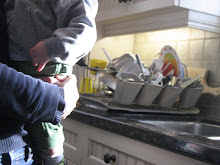Read this essay from The Guardian online, by Rachel Cusk, on women and writing. I'll quote a passage from it:
When a woman in 2009 sits down to write, she perhaps feels rather sexless. She is inclined neither to express nor deny: she'd rather be left alone to get on with it. She might even nurture a certain hostility towards the concept of "women's writing". Why should she be politicised when she doesn't feel politicised? It may even, with her, be a point of honour to keep those politics as far from her prose as it is possible to get them. What compromises women – babies, domesticity, mediocrity – compromises writing even more. ... Her own life is one of freedom and entitlement, though her mother's was probably not. Yet she herself is not a man. She is a woman: it is history that has brought about this difference between herself and her mother. She can look around her and see that while women's lives have altered in some respects, in others they have remained much the same. She can look at her own body: if a woman's body signifies anything, it is that repetition is more powerful than change. But change is more wondrous, more enjoyable. It is pleasanter to write the book of change than the book of repetition. In the book of change one is free to consider absolutely anything, except that which is eternal and unvarying. "Women's writing" might be another name for the book of repetition.
Domesticity, babies, our bodies. Repetition; change. Are we circling perpetually around the same questions and problems of how to balance our own lives and needs while meeting the needs of those for whom we are responsible because what underlies these questions does not change? Because we are our bodies.
I have a piece in Senses of Cinema
6 years ago

